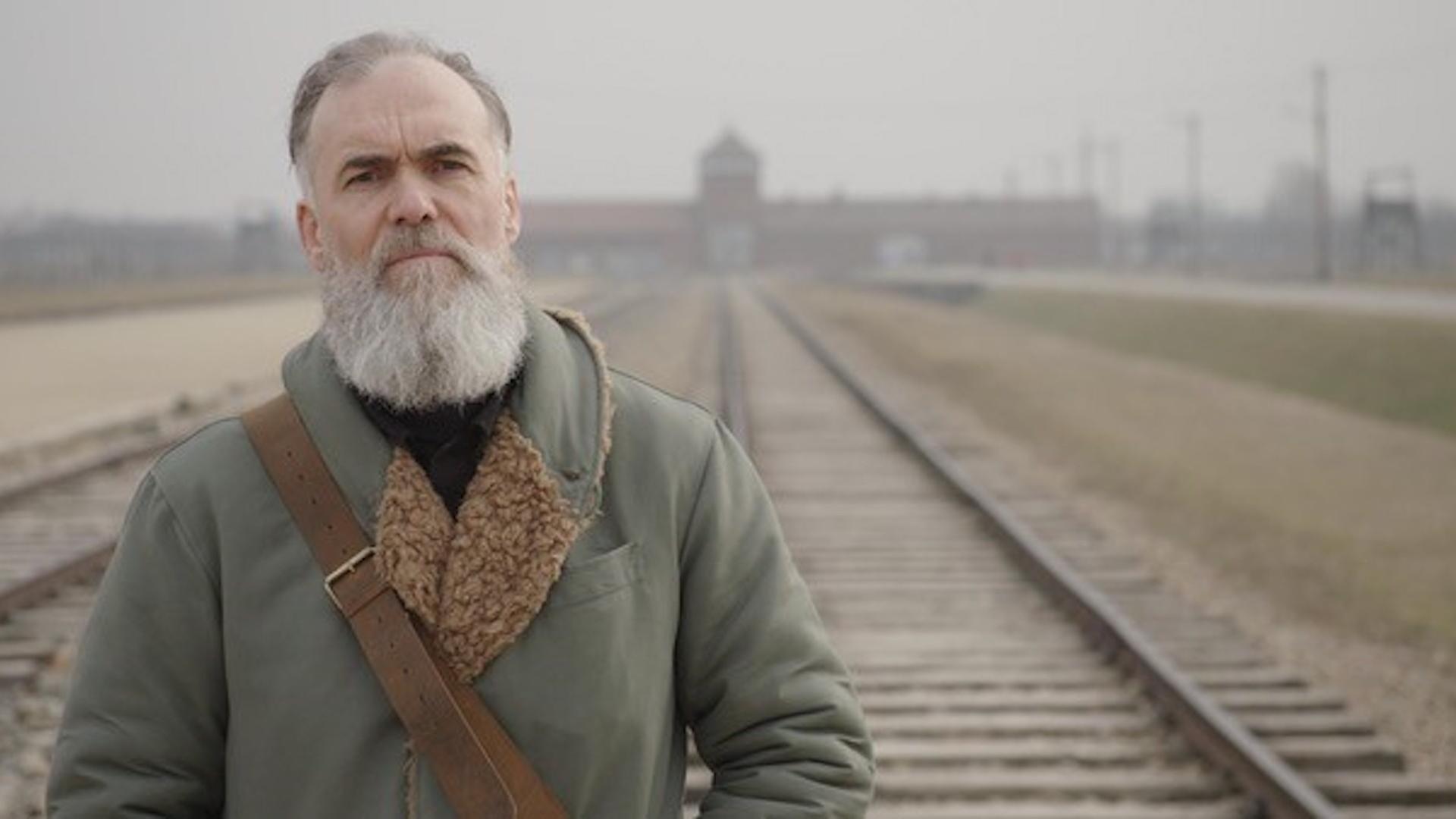
Getting Away with Murder(s)
Up to 1 million Nazis carried out the murders but in West Germany fewer than 7,000 were punished. Why?
Project
Getting Away with Murder(s)
By May 1944, 10,000 people were being murdered every day in Auschwitz. Over 8,000 Nazi members of the Waffen-SS were serving at the largest single mass murder site in history. 7,000 of these people survived the War. However, only around 800 of these men and women were ever put on trial and prosecuted for war crimes.
Over 6,000 Nazis were left to live out the rest of their lives free of punishment, even though they directly participated in industrial-scale killing. They got away with murder.
Prof. Mary Fulbrook arguably one of the world's most knowledgeable experts on the causes and aftermath of the Holocaust says that between 300,000-1 million carried out the murders and states that just under 7,000 were ever prosecuted in Germany. (She has been awarded the 2019 Wolfson History Prize for her book Reckonings: Legacies of Nazi Persecution and the Quest for Justice).
We have so far filmed our documentary feature film at Auschwitz-Birkenau in Poland. We have recorded further material in the Czech Republic, Germany, Lithuania, Latvia and the UK.
David Wilkinson is extremely experienced as a film director, producer and distributor, with his company Guerilla Films. His experience and ambition for the film will ensure it reaches as wide an audience as possible, throughout the process of production and distribution.
Philip Rubenstein one of the true unsung heroes of the quest to bring the Nazi war criminals living in the UK to justice.
What is different about Getting Away With Murder(s)?
There have been so many excellent films and TV programmes about the Holocaust, but Getting Away With Murder(s) is, to our knowledge, the first feature-length documentary for the cinema to explore how, and why, the execution of the London Agreement fell short.
The director David Wilkinson brings commitment and righteous anger to his exploration of this difficult subject. As his research into the Holocaust and its aftermath progressed over the years, the more he discovered ever-further undisputable evidence of mass murder, and the more he questioned why so few were prosecuted.
At least 300 suspected Nazi war criminals have been known to be living throughout the UK; yet only one was ever prosecuted and found guilty, some thirty years after the War ended. It goes against all the precepts of being part of a so-called civilised society. Abandoning the quest for justice for those innumerable innocent men, women and children goes against everything British justice is meant to stand for.
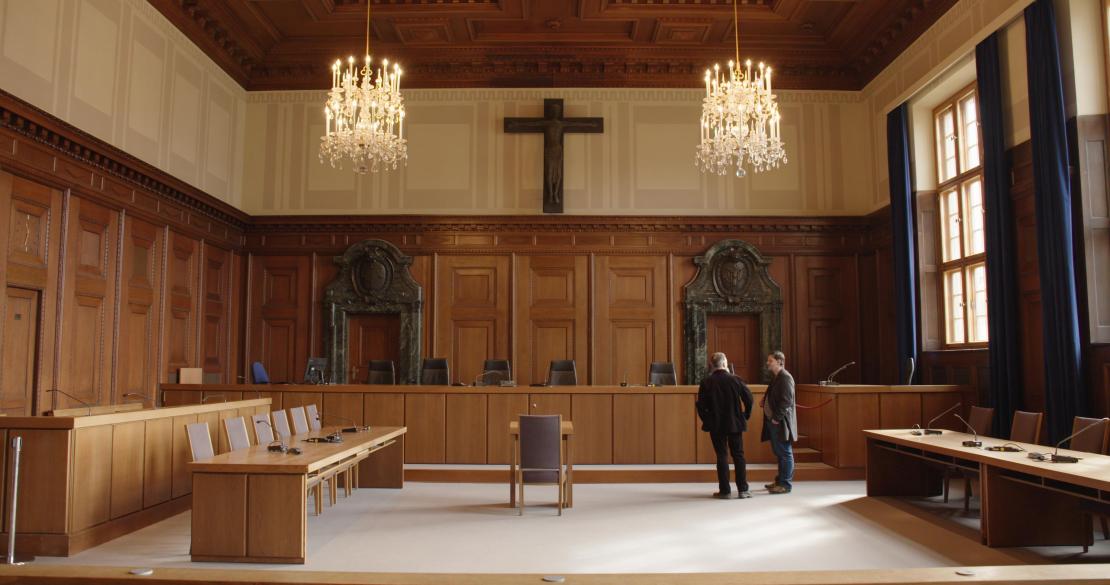
Where will the film be seen?
As well as being a filmmaker, David has worked as a distributor, releasing over 120 films in the cinema, on DVD, online and on TV in the UK & Ireland. Getting Away With Murder(s) will receive a full cinema release followed by screenings on the other platforms. However, it will first be screened in film festivals around the world, so ensuring that the subject matter gets maximum exposure across a range of media who cover festival and cinema releases. In recent years, the documentary feature films Wilkinson has been involved in producing have been seen at many of the worlds most prestigious film festivals including Sundance, Edinburgh, IDFA, Doc/Fest, Hot Docs, Denver, Galway, True/False, Film Fest Gent, etc where they have occasionally won awards.
The goal of the film is to make certain that as many people as possible know the truth, that most of those who carried out the murders were never prosecuted, something that so many are currently completely unaware of.
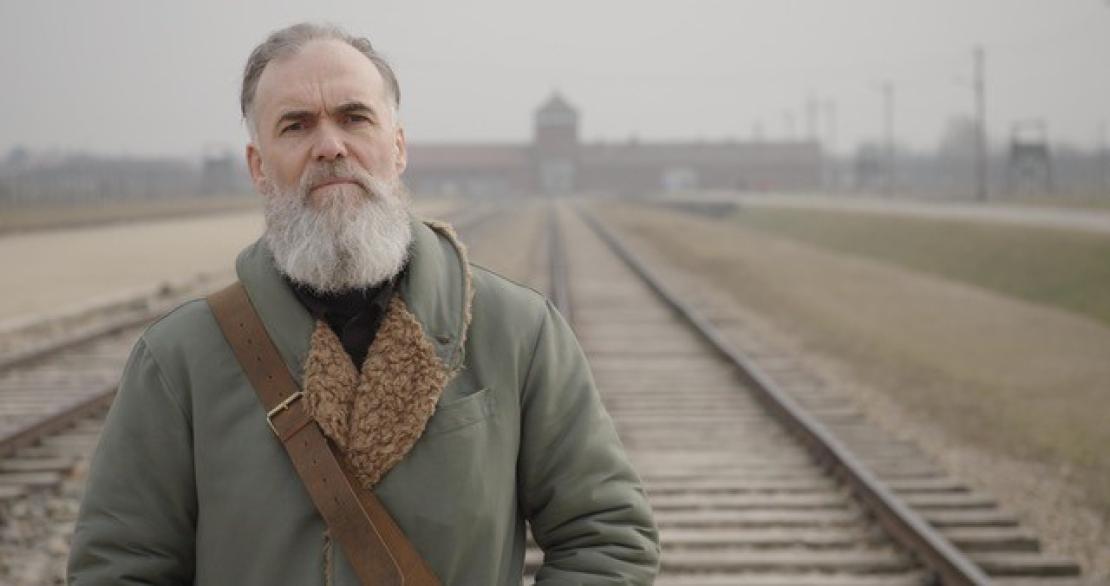
Director David Wilkinson at Auschwitz-Birkenau
Director’s statement
Making this film is my way of seeking answers and the truth.
It is outrageous that the vast majority of those who carried out the Holocaust murders were never prosecuted, and for the loved ones of those murdered, it must have left a hole, a want of care, a seeming lack of humanity and fellow-feeling, an abandonment of due process, the completely unacceptable absence of Justice.
I am raising the money to make this film privately for two reasons.
The first is that this film is unashamedly biased, as I believe that it was outrageous that so little was done to prosecute the tens of thousands of people who carried out the murder of millions of innocent men, women, children and infants on an industrial scale. I do not care who I upset in finding out why this was allowed to happen. In today's media, one is constantly being told to put both sides of the argument and put forward the bigger picture. In this particular instance, I have no intention of doing this.
Secondly, with television, which is how most feature documentaries are funded, many seem to demand homogenised times - 60 minutes or 90 minutes - if you are making it with their money (a documentary we are associated with had this problem). With the acquisition of a film, broadcasters often screen longer films, especially if that film has had a prominent profile from the cinema release. As this project addresses the greatest miscarriage of justice in the history of mankind, it must be told properly and thoroughly. Two of the best faultless films made about the Holocaust Claude Lanzmann’s Shoah documentary is 566 minutes long and Steven Spielberg’s drama Schindler’s List is 195 minutes. Getting Away With Murder(s) will ultimately be whatever the answer to its fundamental question requires it to be.
The Team
David Wilkinson entered the entertainment industry in 1970, playing the title role in a West End production of The Winslow Boy. During the following 10 years, he performed in over 40 theatre, TV and film productions, including the title part in Ian McEwan's initial drama for the screen, Jack Flea’s Birthday Celebration, for the BBC directed by Mike Newell; Alan Strang in Equus for which he won an acting award; Stu Sutcliffe, the 5th Beatle, in Richard Marquand’s film Birth of the Beatles.
He became the first true independent producer to work with the BBC in 1982 when we pioneered the Reverse Drama Co-Production for a film of Virginia Woolf's To the Lighthouse, starring Kenneth Branagh, which was nominated for a BAFTA award. He also offered Anthony Hopkins his first chance to be a director for the screen with Dylan Thomas: Return Journey.
Since 1998, apart from Alex Gibney's Zero Days, he has distributed only British & Irish films in the cinema, on DVD, etc. throughout the UK and Ireland, specialising in supporting the difficult or uncommercial ones that no one else has wanted. No other film distributor has ever made such a commitment to British films. Although this was not financially rewarding, it was creatively satisfying; and, had he not released these films, most of them would never have been seen in the UK.
Getting Away with Murder(s) is his third feature-length cinema documentary as a director and presenter, and his ninth feature-length documentary as a producer.
Emlyn Price (Co-writer)
Emlyn Price is a former actor and writer who has worked with David Wilkinson over the last 25 years, writing a number of screenplays, educational films, corporate productions, documentaries and books. He has also written a number of plays for the theatre.
Don McVey (Director of Photography)
Don McVey was the DOP on Wilkinson’s last two films. He also directed his own documentary short film, The Price of Love, which Wilkinson produced. This screened on the Independent and Telegraph websites and on RT and was nominated for the Liberty Human Rights Award. He has shot commercials for companies such a Cadbury’s, Lego and 3 Mobile; worked with artists such as Little Mix, Take That and Ellie Goulding and recently won a Best Cinematography advertising award for a Malaria charity spot with Stephen Magnan.
Chris Barnett (Composer)
Christopher Barnet thas composed scores for independent films and documentaries which have broadcast on BBC, Film4, Channel 4, ITV, SKY and Horror Channel. Many have been nominated/awarded at prestigious international film festivals, the BAFTA-nominated A Cock & Bull Story, a notable example. He has worked previously with David Wilkinson on three other feature-length documentaries, and for one of them, The First Film, he was awarded Best Original Score for a Documentary in the TMT Media Awards 2015.
Jon Walker (Post Production Supervisor)
Jon Walker has edited dozens of documentaries across a wide range of subjects and recent projects include Horizon: Goodbye Cassini – Hello Saturn, China: Between Clouds and Dreams(a five-part series) and the BAFTA-nominated Baka – A Cry from the Rainforest.
Executive Producers include A McMahon, Georgia Slowe and Bill Lawrence.
Associate Producer David M Brown.
Researcher John Suriano
Very Special Thank You to Tony Lewis.
Whenever possible Wilkinson uses people he has worked with before, but this is subject to their availability at the time he needs them.
 Lidice Memorial, the Czech Republic with Filip Petlička
Lidice Memorial, the Czech Republic with Filip Petlička
With Pavlina Zipkova at the Ss. Cyril and Methodius Cathedral, Prague, Czechia
All images, text and video on this page are copyright ©️ Guerilla Films Ltd. 2019-2020.
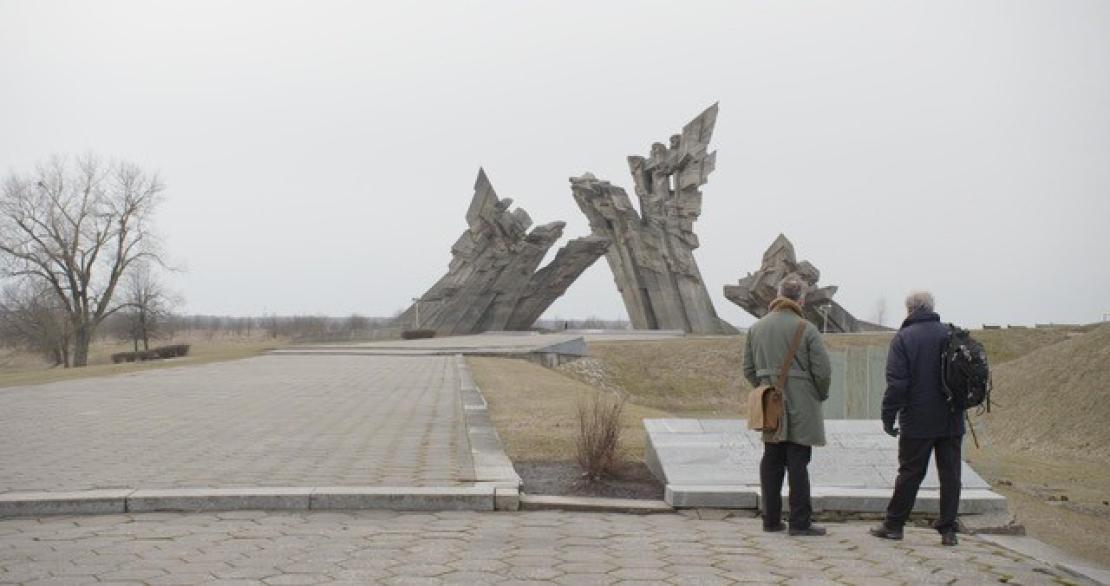
At The Way Of Death, 9th Fort Kaunas, Lithuania with Robin Lustig British journalist and radio broadcaster, who has presented the BBC's Radio 4's The World Tonight and BBC World Service's Newshour.
Why are you making this?
This story is now urgent. Antisemitism is on the rise, in the UK and elsewhere in Europe. Recent atrocities in Pittsburgh and San Diego have shown that violence is a clear and present danger. As a society, we have to challenge both how these attitudes arise, and how criminal activity was allowed to go unpunished, and often forgotten, for so long.
The London Agreement of 8th August 1945 was the treaty between the British, the French, the USA and Russia that sought to bring the perpetrators of the atrocities of the camps to justice. Yet judicial inaction and lack of political will have meant that few were prosecuted. We demand to know why.
Moreover, we are now approaching the 75th anniversary of the liberation of Auschwitz. The youngest survivors – those born in the camps – are in their late seventies, those with more complete memories are even older. It is essential and urgent that their first-hand testimony is captured and recorded – and this is the purpose of Getting Away With Murder(s), before those witnesses are lost to time.
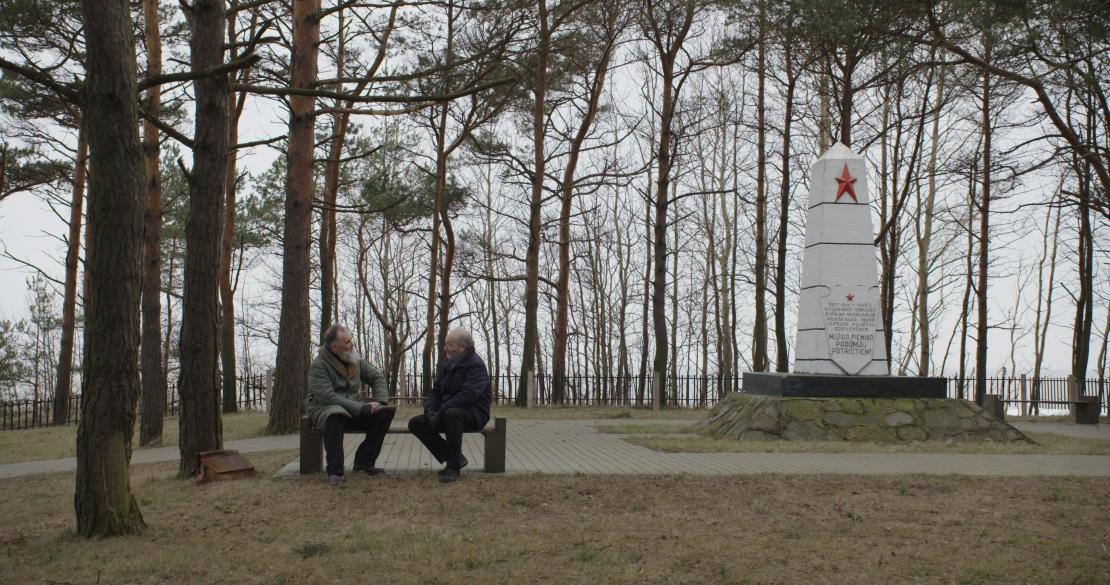
The Soviet Memorial at Šķēde Beach Latvia with Robin Lustig
How much do you need, and what will the money be used for?
We are seeking to raise £30,000 to pay for the director and a tiny crew to film interviews with survivors, and witnesses to these atrocities and their aftermath, across the United States and other countries such as France, Austria and back to Germany. The funding is required for the crew's fees, travel, visas, carnets, equipment hire and logistics, insurance, accommodation and the many other incidentals of documentary filmmaking.
The director will not be taking a fee.
This £30,000 crowdfunding campaign is for this American segment of production and to visit other countries. Just like some of Wilkinson's other films, the budget is being raised in stages due to the urgent nature of its subject. It is intended that the film’s overall budget will eventually be £400,000 if the true story is to be told as thoroughly as it deserves. The production funding so far has been covered from other sources, largely from the filmmakers’ own slender resources as well as charitable support.
We believe that this additional material will be of exceptional worth to the production, and to explore the role of US Forces and the US judicial system in bringing the perpetrators to justice. The Nuremberg Military Tribunal was led by the Americans.
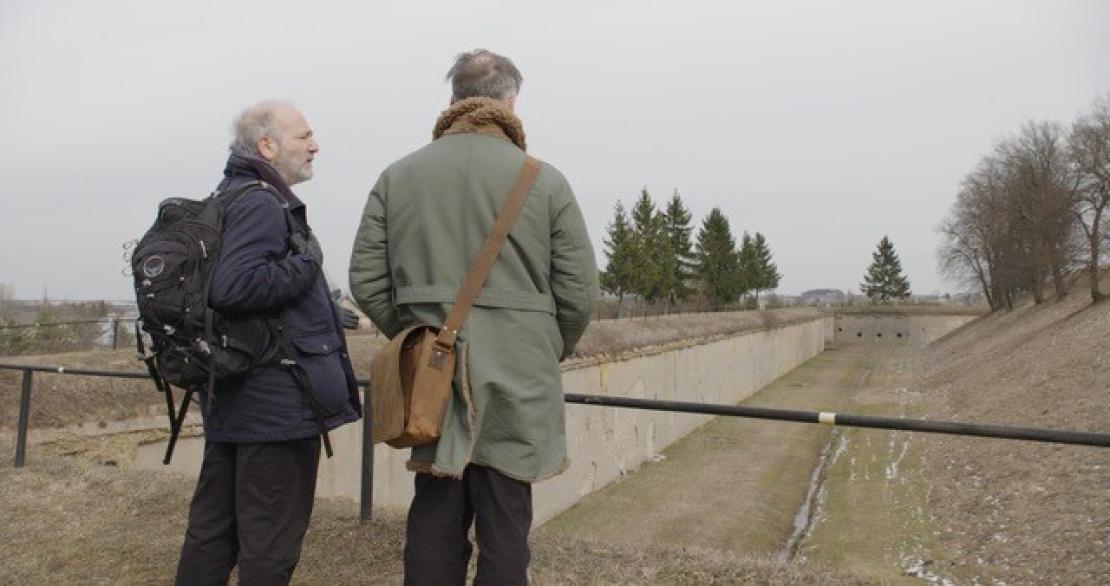
A mass burial pit at the 9th Fort Kaunas, Lithuania where Robin Lustig’s German grandmother was murdered
Why are you crowdfunding?
This important documentary seeks to discover why so many of those who committed murder during the Holocaust were never prosecuted or even questioned. British filmmaker David Wilkinson has been trying to make this film for a long time, but the difficult subject has not been of interest to any film UK or TV funding organisation. Consequently, we are taking the approach of crowdfunding – if you also feel this story needs to be told, then you can help us.
Crowdfunding is a challenging process, particularly when dealing with as grave a subject matter as we are with Getting Away With Murder(s). We have given very serious thought to the nature of the rewards offered to backers, and feel that the usual offerings such as teeshirts and postcards would not be appropriate. We are looking for people to support the film who, like us, want an answer to that fundamental question - why did so many murders go unpunished?
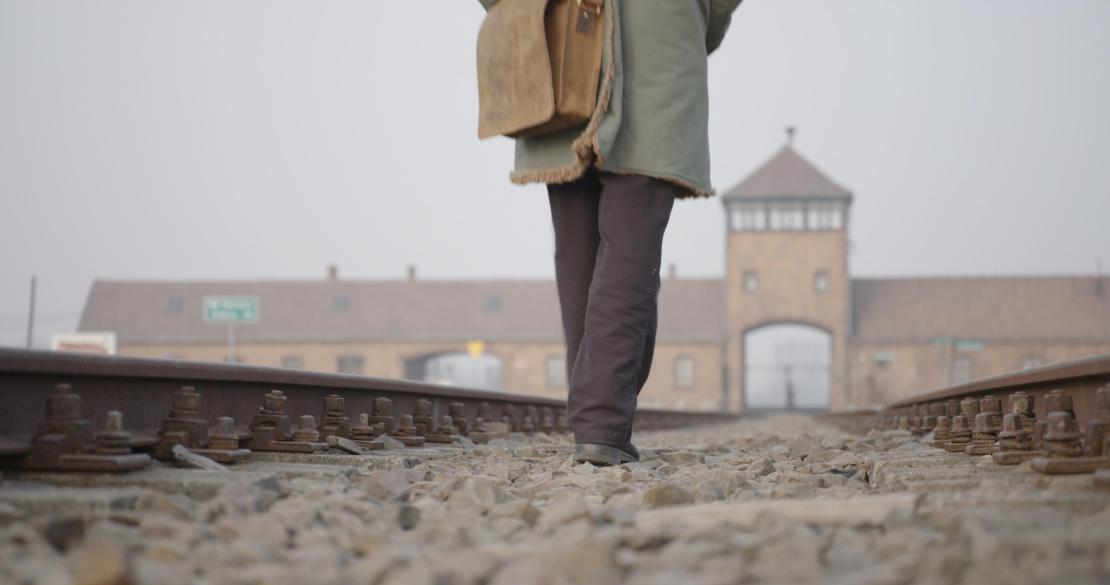
We have, however, designed some levels of participation to show appreciation for your support. We will fully acknowledge your participation, either via the film’s website, social media or in the credits. We are also arranging a schedule whereby David Wilkinson will be updating supporters daily throughout the US segment of production, through additional material such as real-time email or video updates, or through group or individual Skype calls. We feel this allows you to come on this important journey with us, as we share our discoveries.
We are in a race against time to capture these untold stories and voices before it is too late. Any support you can offer at any level will be hugely important, to us and to the film. If you feel you could participate in the production of Getting Away With Murder(s) at a higher level, then please contact us via this link. This campaign is on an all-or-nothing basis, meaning that unless we hit the £30,000 target before the close date of 30 September, then we will not be able to access any of the pledged funds. For this reason, even if you are unable to contribute financially, please share this project with your friends and family, and help us make it happen.
If we surpass our £30,000 target, the additional funding will be used to expand the scope of the documentary. We wish to return to Germany and visit Israel, France, Argentina, Austria, Brazil, Denmark and Bulgaria whose stories would make Getting Away With Murder(s) even more comprehensive and compelling.
We feel very strongly we must go where the story leads us. The Nazis and their collaborators travelled the world to escape justice and so we must follow that trial and record it. It really is utterly shocking how so many people turned a blind eye to mass murderers hiding in plain sight.
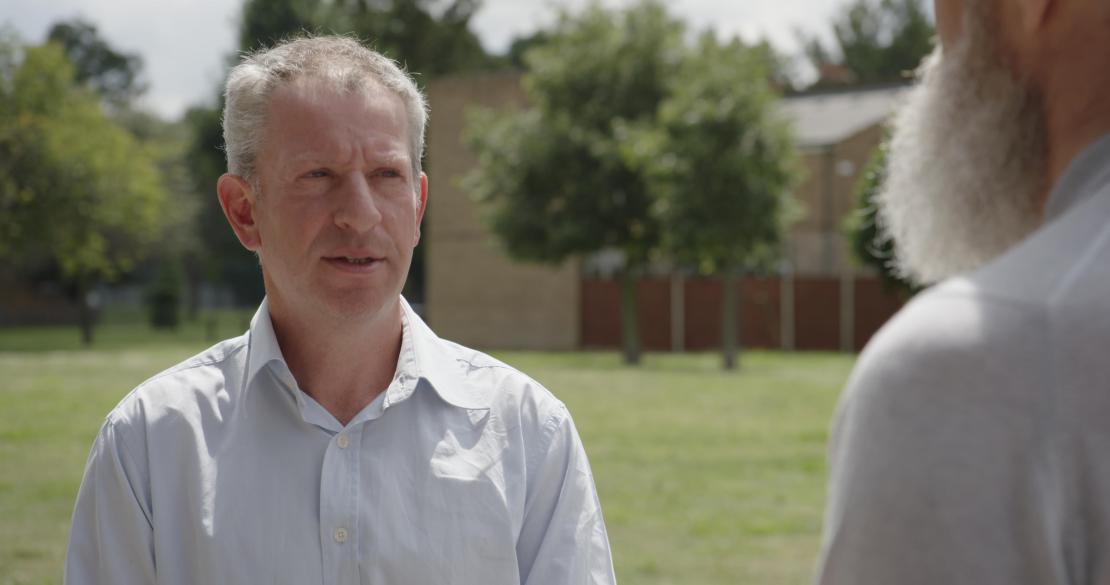
Philip Rubenstein one of the true unsung heroes of the quest to bring the Nazi war criminals living in the UK to justice.
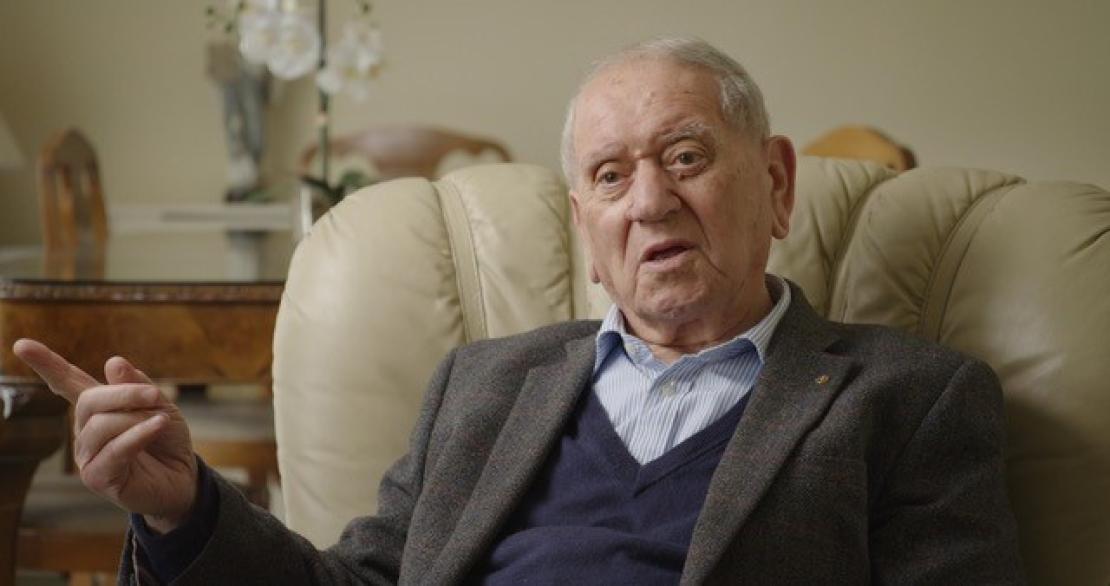
Interviewee Arek Hersch, a survivor of four concentration camps
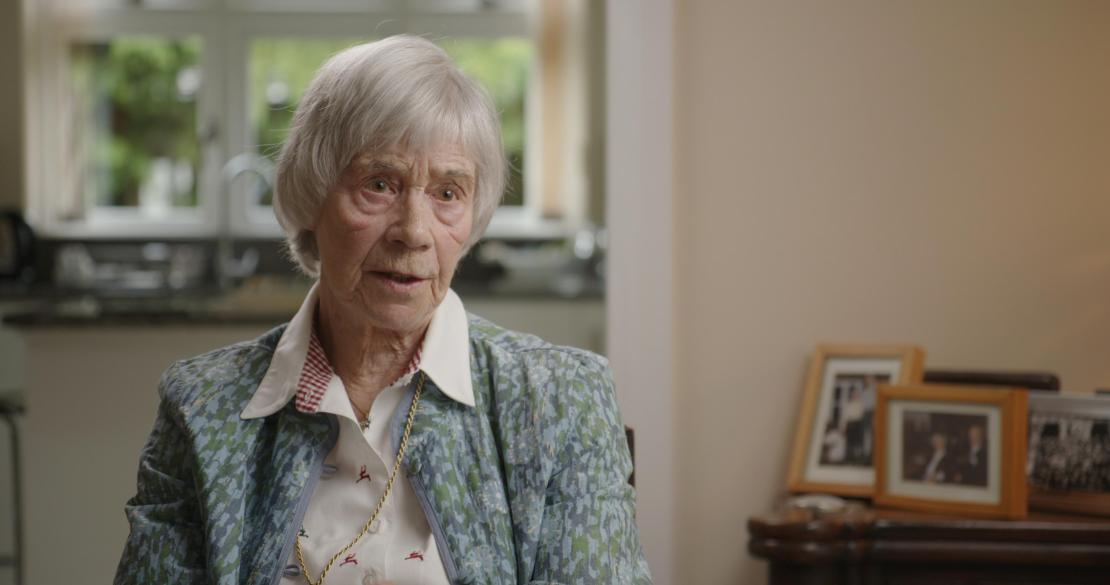
Interviewee Kitty Hart- Moxon, a survivor of seven different camps.
What is different about Getting Away With Murder(s)?
There have been so many excellent films and TV programmes about the Holocaust, but Getting Away With Murder(s) is, to our knowledge, the first feature-length documentary for the cinema to explore how, and why, the execution of the London Agreement fell short.
The director David Wilkinson brings commitment and righteous anger to his exploration of this difficult subject. As his research into the Holocaust and its aftermath progressed over the years, the more he discovered ever-further undisputable evidence of mass murder, and the more he questioned why so few were prosecuted.
At least 300 suspected Nazi war criminals have been known to be living throughout the UK; yet only one was ever prosecuted and found guilty, some thirty years after the War ended. It goes against all the precepts of being part of a so-called civilised society. Abandoning the quest for justice for those innumerable innocent men, women and children goes against everything British justice is meant to stand for.
Where will the film be seen?
As well as being a filmmaker, David has worked as a distributor, releasing over 120 films in the cinema, on DVD, online and on TV in the UK & Ireland. Getting Away With Murder(s) will receive a full cinema release followed by screenings on the other platforms. However, it will first be screened in film festivals around the world, so ensuring that the subject matter gets maximum exposure across a range of media who cover festival and cinema releases. In recent years, the documentary feature films Wilkinson has been involved in producing have been seen at many of the worlds most prestigious film festivals including Sundance, Edinburgh, IDFA, Doc/Fest, Hot Docs, Denver, Galway, True/False, Film Fest Gent, etc where they have occasionally won awards.
The goal of the film is to make certain that as many people as possible know the truth, that most of those who carried out the murders were never prosecuted, something that so many are currently completely unaware of.
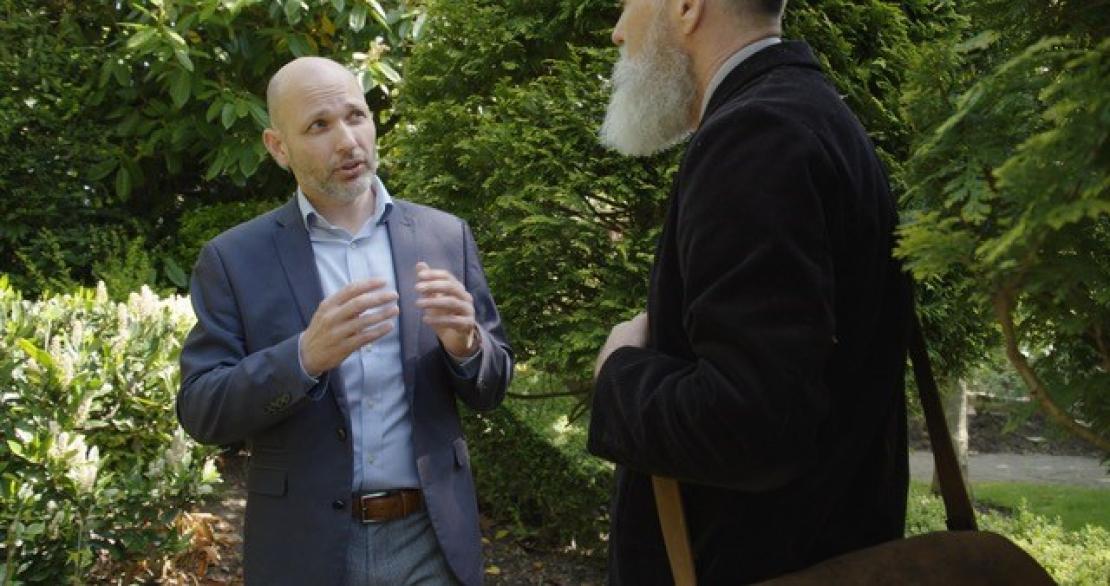
Dr James Smith, National Holocaust Centre, Nottinghamshire, UK
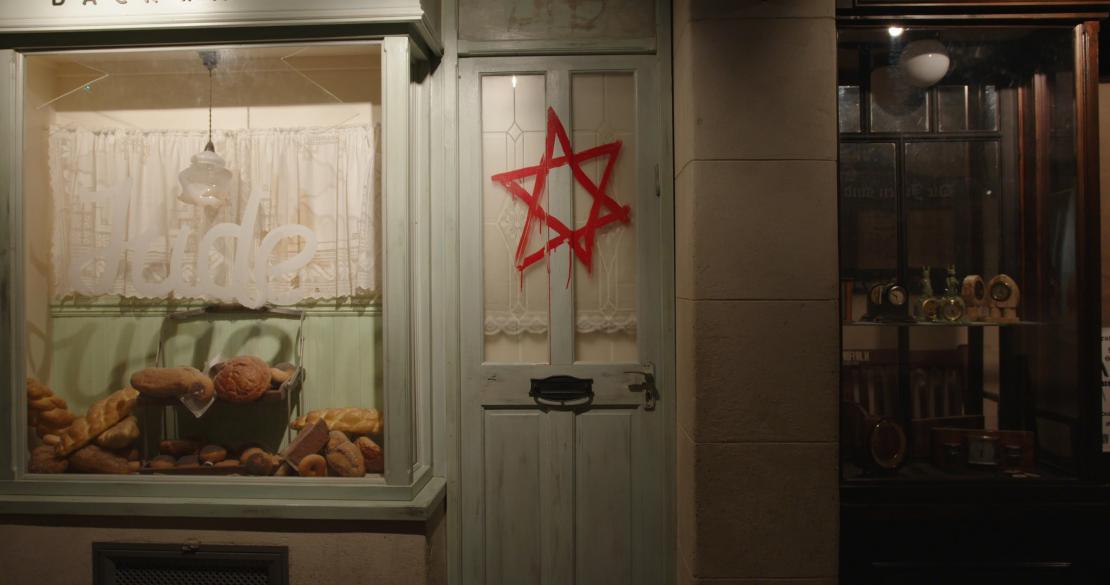
The National Holocaust Centre, Laxton, Nottinghamshire, UK
The Team
David Wilkinson entered the entertainment industry in 1970, playing the title role in a West End production of The Winslow Boy. During the following 10 years, he performed in over 40 theatre, TV and film productions, including the title part in Ian McEwan's initial drama for the screen, Jack Flea’s Birthday Celebration, for the BBC directed by Mike Newell; Alan Strang in Equus for which he won an acting award; Stu Sutcliffe, the 5th Beatle, in Richard Marquand’s film Birth of the Beatles.
He became the first true independent producer to work with the BBC in 1982 when we pioneered the Reverse Drama Co-Production for a film of Virginia Woolf's To the Lighthouse, starring Kenneth Branagh, which was nominated for a BAFTA award. He also offered Anthony Hopkins his first chance to be a director for the screen with Dylan Thomas: Return Journey.
Since 1998, apart from Alex Gibney's Zero Days, he has distributed only British & Irish films in the cinema, on DVD, etc. throughout the UK and Ireland, specialising in supporting the difficult or uncommercial ones that no one else has wanted. No other film distributor has ever made such a commitment to British films. Although this was not financially rewarding, it was creatively satisfying; and, had he not released these films, most of them would never have been seen in the UK.
Getting Away with Murder(s) is his third feature-length cinema documentary as a director and presenter, and his ninth feature-length documentary as a producer.
Emlyn Price (Co-writer)
Emlyn Price is a former actor and writer who has worked with David Wilkinson over the last 25 years, writing a number of screenplays, educational films, corporate productions, documentaries and books. He has also written a number of plays for the theatre.
Don McVey (Director of Photography)
Don McVey was the DOP on Wilkinson’s last two films. He also directed his own documentary short film, The Price of Love, which Wilkinson produced. This screened on the Independent and Telegraph websites and on RT and was nominated for the Liberty Human Rights Award. He has shot commercials for companies such a Cadbury’s, Lego and 3 Mobile; worked with artists such as Little Mix, Take That and Ellie Goulding and recently won a Best Cinematography advertising award for a Malaria charity spot with Stephen Magnan.
Chris Barnett (Composer)
Christopher Barnet thas composed scores for independent films and documentaries which have broadcast on BBC, Film4, Channel 4, ITV, SKY and Horror Channel. Many have been nominated/awarded at prestigious international film festivals, the BAFTA-nominated A Cock & Bull Story, a notable example. He has worked previously with David Wilkinson on three other feature-length documentaries, and for one of them, The First Film, he was awarded Best Original Score for a Documentary in the TMT Media Awards 2015.
Jon Walker (Post Production Supervisor)
Jon Walker has edited dozens of documentaries across a wide range of subjects and recent projects include Horizon: Goodbye Cassini – Hello Saturn, China: Between Clouds and Dreams(a five-part series) and the BAFTA-nominated Baka – A Cry from the Rainforest.
Executive Producers include A McMahon, Georgia Slowe and Bill Lawrence.
Associate Producer David M Brown.
Researcher John Suriano
Very Special Thank You to Tony Lewis.
Whenever possible Wilkinson uses people he has worked with before, but this is subject to their availability at the time he needs them.
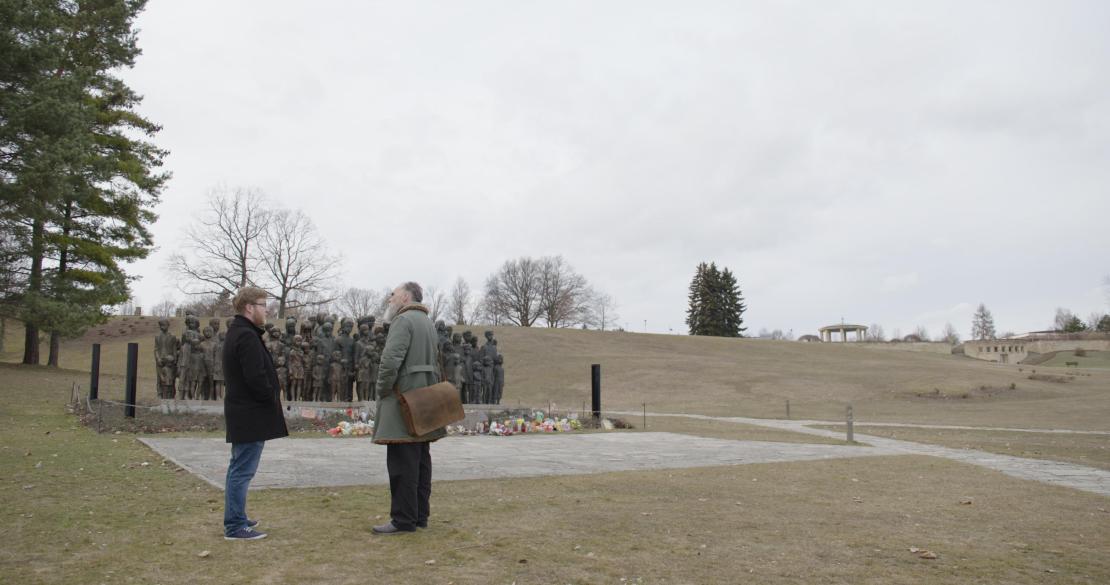
Lidice Memorial, the Czech Republic with Filip Petlička
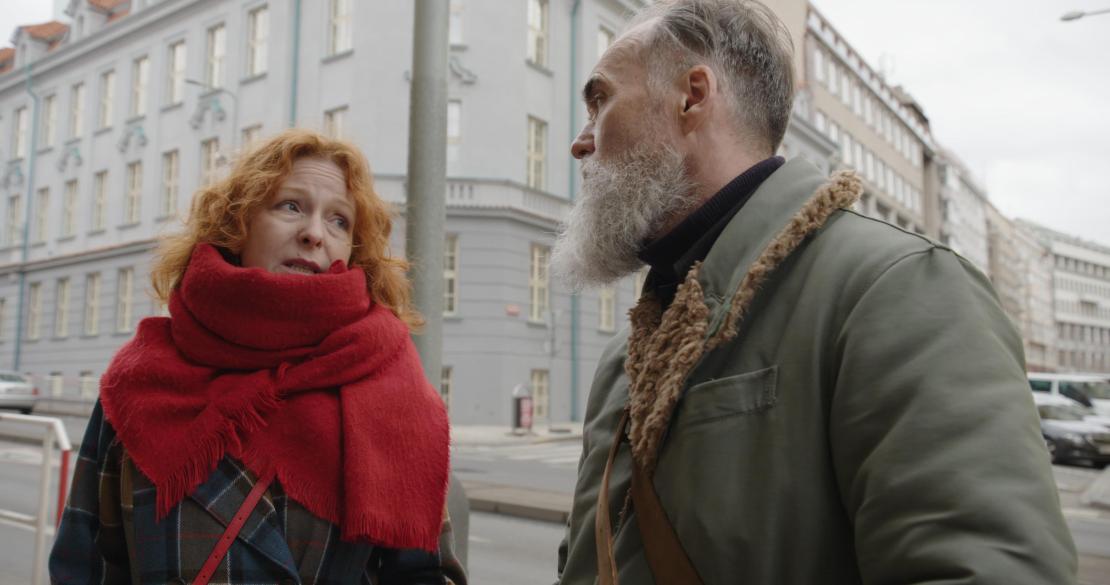
With Pavlina Zipkova at the Ss. Cyril and Methodius Cathedral, Prague, Czechia
All images, text and video on this page are copyright ©️ Guerilla Films Ltd. 2019-2020.
Updates
Mary Fulbrook
The historian Mary Fulbrook has has agreed to be interviewed in the film in London and in Berlin. Since 1995, she has been Professor of German History at University College London.
Jewish Telegraph
The Jewish Telegraph this week ran an article about the film.
However, we do hope that donations come in from non-Jews because as Dr James Smith says in the film it was a crime against humanity.
Next filming
Philip Rubenstein has agreed to be in the film.
Philip was the director of the All-Party Parliamentary War Crimes Group, which campaigned successfully in the 1980s to change the law to enable the prosecution of Nazi war criminals living in the UK.
Sad News
The Holocaust will very soon pass from living memory to history and I needed to record some of those people who witnessed it which is why I started filming without all the money in place.
Sad News
The Holocaust will very soon pass from living memory to history and I needed to record some of those people who witnessed it.
Philip Rubenstein
We have just filmed Philip Rubenstein in Bermondsey, London near the former home of the only person to be prosecuted for war crimes living in the UK. This man had worked in a UK hospital for 7 years and then for British Rail for 26 years.
Ireland
We filmed in Galway last Sunday.
Ireland was, of course, neutral in World War II but we make an important point about how the British government bent the rules to suit themselves.
Berlin
In the car from London to Berlin. The first shoot will be Hitler's bunker.
Berlin
This is a recce of the Berlin Memorials to the Jews, Roma, Sinti, Homosexuals and Euthanasia victims.
Further fiming in Germany
I am discombobulated.
Don McVey (camera), Rory Smith (sound) and I are having wonderful cake and iced coffee in quaint old bakery cafe in the most charming picturesque of towns in Austria......sitting opposite Adolf Hitler's birthplace.